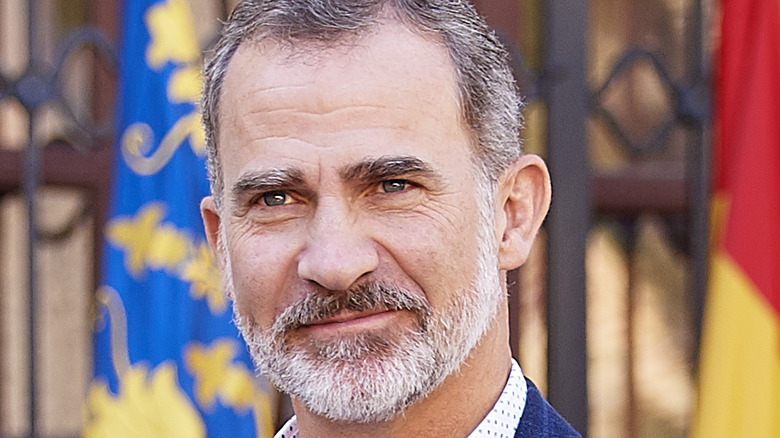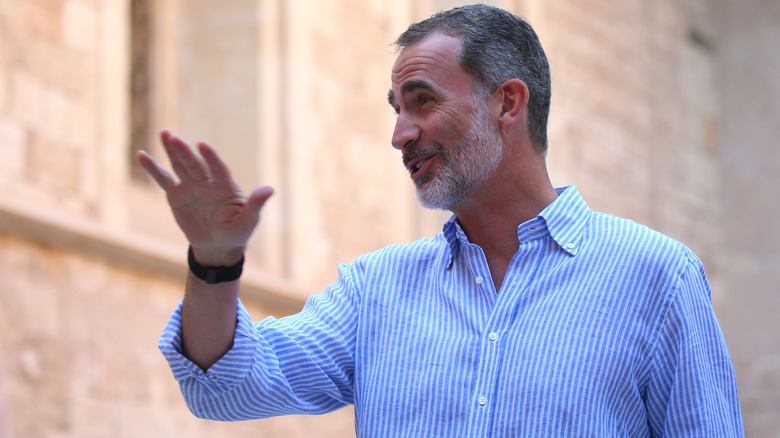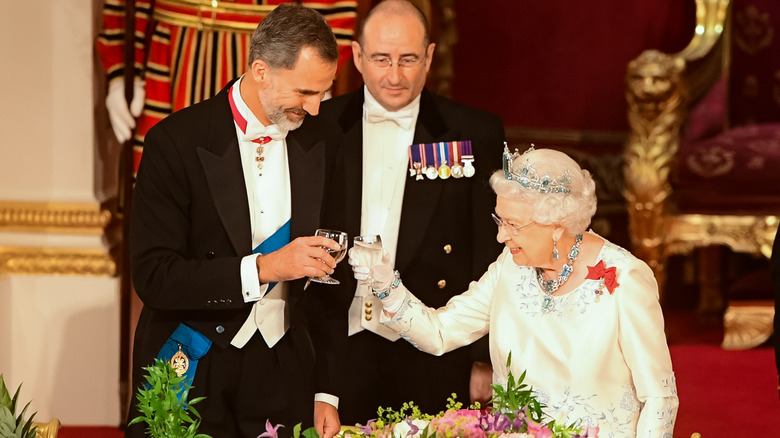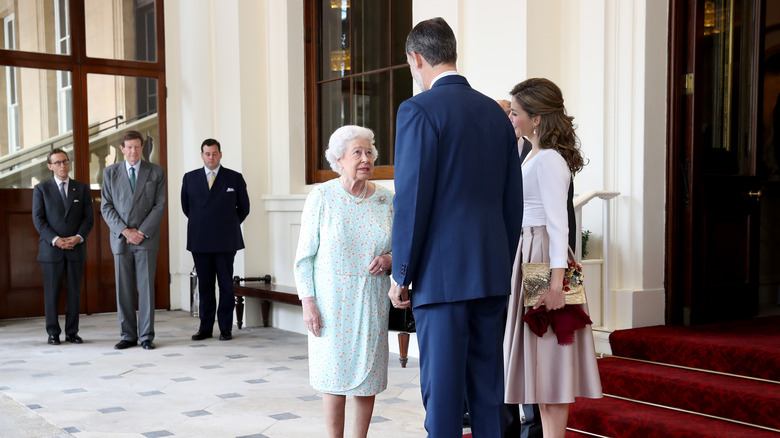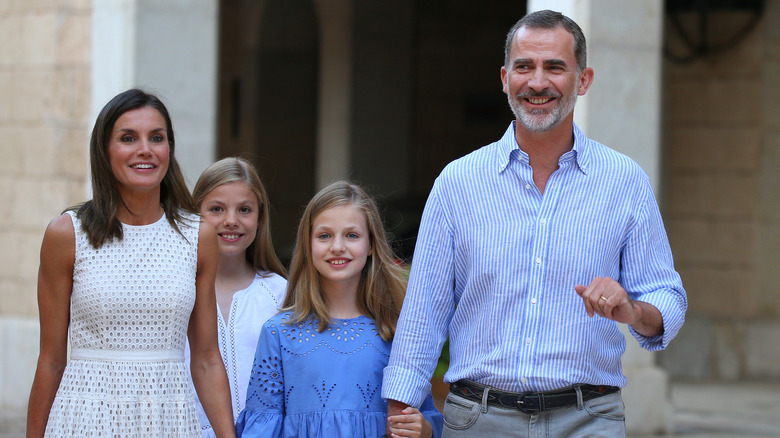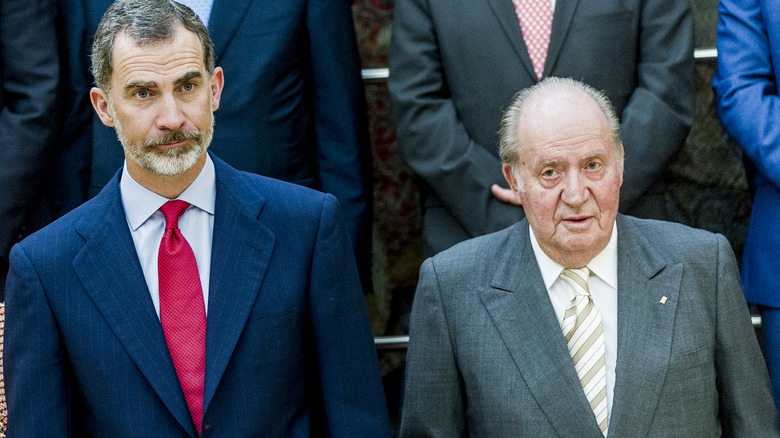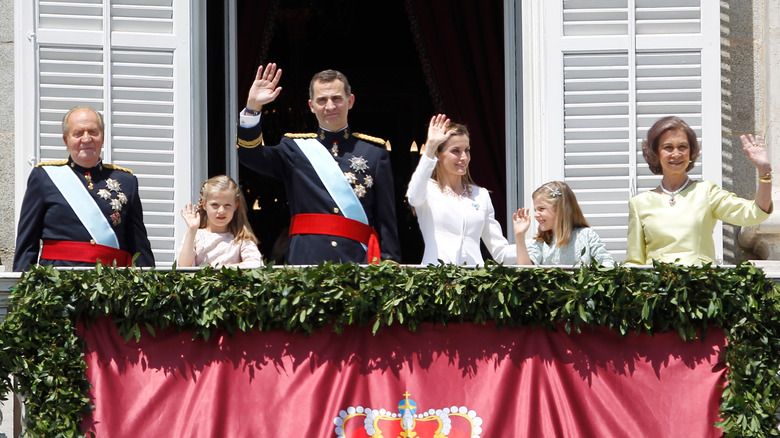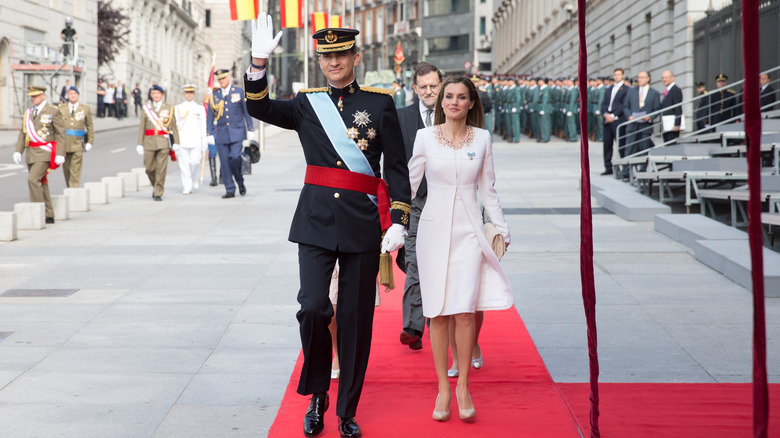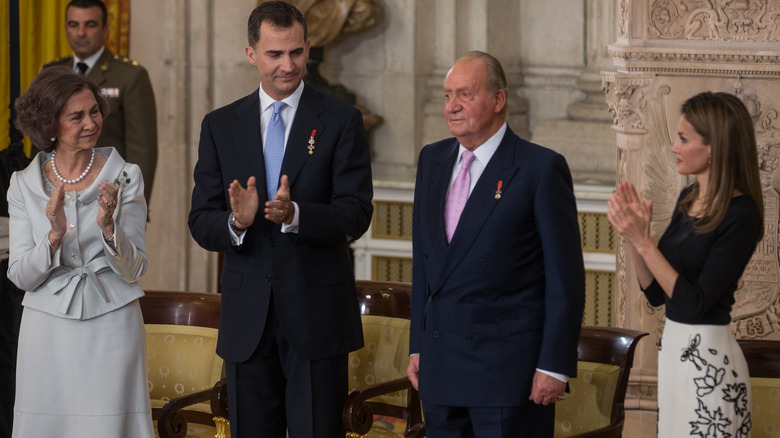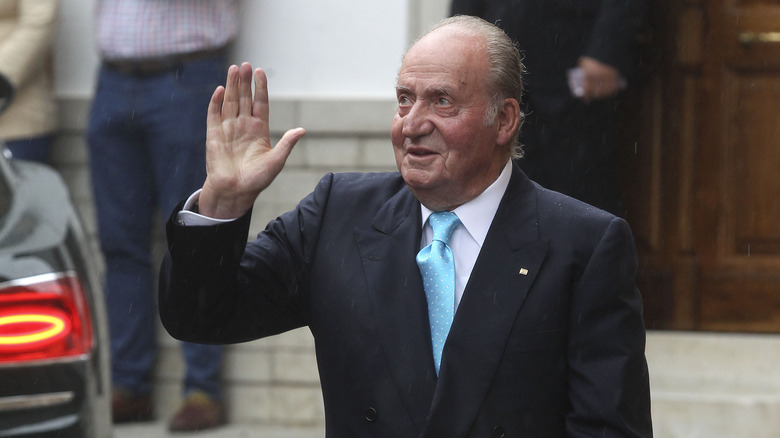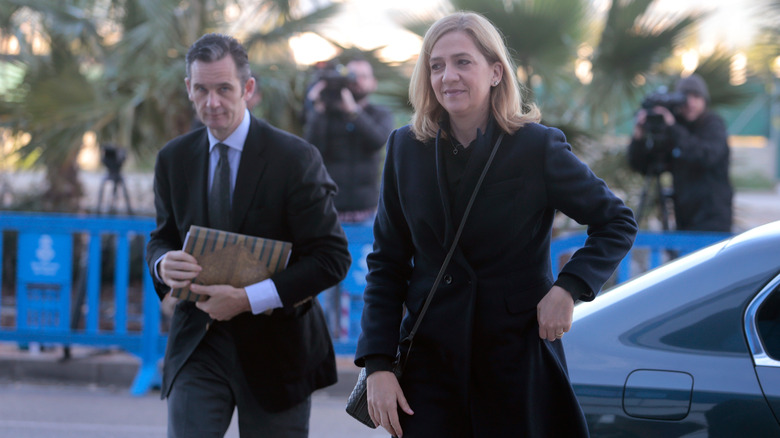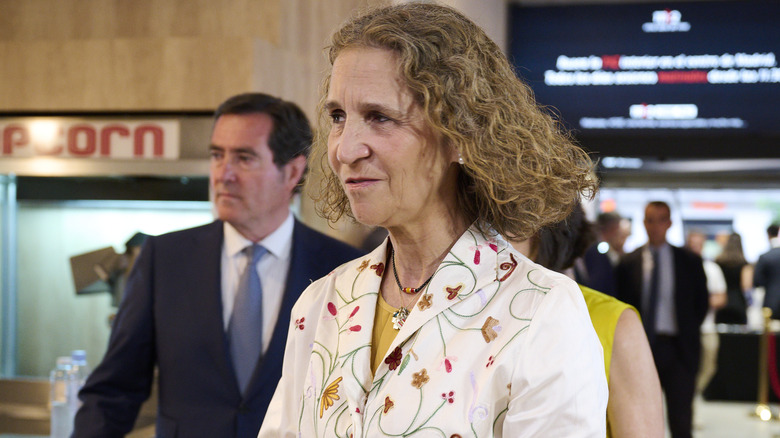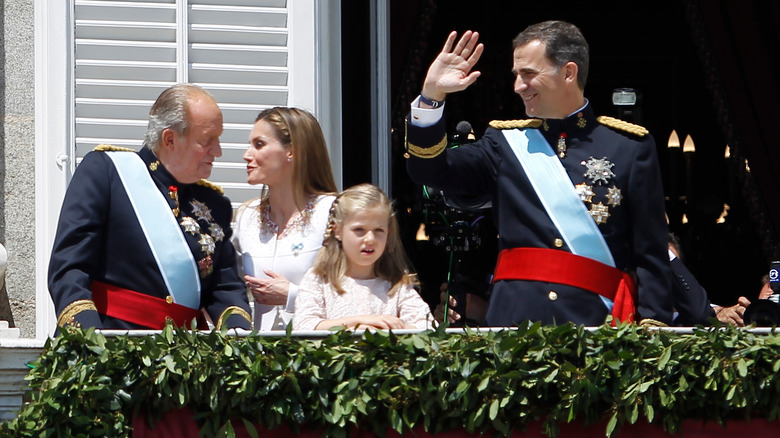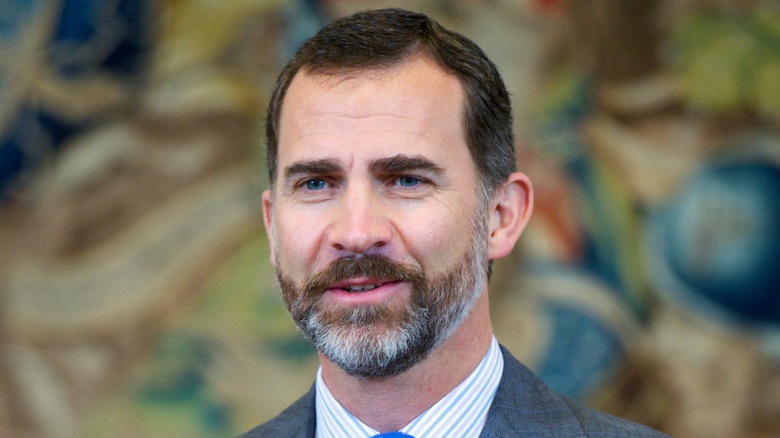The Truth About King Felipe VI Of Spain
Correction 8/25/22: An earlier version of this article misstated the Spanish monarch's role regarding prime ministers. This has been corrected to show the monarch nominates the prime minister, whereas parliament elects the prime minister.
His Majesty King Felipe VI of Spain, was born Felipe Juan Pablo Alfonso de Todos los Santos de Borbón y Grecia on January 30, 1968. He has been Spain's monarch since 2014, to generally favorable approval ratings (via DW). Standing at over 6 feet tall, with a thick head of salt and pepper hair, blue eyes, and an engagingly wry smile, he is known for his serious, disciplined nature. Felipe honed his sailing prowess while simultaneously earning his undergraduate degree in law and a masters in international relations, as well as rising to lieutenant in several branches of the Spanish military.
TL;DR: King Felipe would appear to be something of a real-life Prince Charming — at least more so than his distant relative, Prince Charles, who was actually known by that fairytale moniker in his youth (per Sun-Sentinel). Nevertheless, Felipe has never attracted all that much international gossip coverage, having been married only once, to Letizia Ortiz Rocasolano, now Her Majesty Queen Letizia, with whom he shares two children, Leonor, Spain's heir presumptive, and the infanta Sofia. However, the same cannot be said of Felipe's father, the former King Juan Carlos, or sister, Cristina, whose respective scandals have beleaguered King Felipe's reign. There's a lot here, so let's unpack.
The role of Spain's monarch
The role of the monarchy in Spain — like that of the U.K. — is largely ornamental but exceedingly important to national unity, culture, and the functioning of the government. Like the U.K., Spain has a constitutional monarchy, meaning the reigning monarch is empowered by the Constitution to act as ceremonial head of state. Although the Spanish monarch nominates the prime minister, the prime minister must be elected by parliament (via Michigan State University).
The official website of the Spanish royal family lists some of the functions the Constitution dictates the monarch is to perform. These include calling for elections and referenda and staying up to date on matters of the state, its governance, and its relationships with other nations through formal meetings.
Although the U.K. and Spain's monarchies and governments have some similarities, the United Kingdom's Constitution dates back to the 13th century whereas Spain's Constitution was adopted in 1978 — three years after Felipe's father, Juan Carlos, ascended the throne after the death of Francisco Franco, whose military dictatorship began in the 1930s after the deposition of Felipe's grandfather, Alfonso XIII. King Felipe has the distinction of being the first monarch to have been guided by the Constitution from day one of his reign.
King Felipe VI considers Queen Elizabeth 'Aunt Lilibet'
Although King Felipe VI has sometimes referred to Queen Elizabeth II as his "Aunt Lilibet," he's not her nephew. Rather, he is her third cousin once removed. To wit: Queen Elizabeth is Queen Victoria's great-great-granddaughter because her father, George VI was the son of George V, who was the son of Edward VII, Queen Victoria's eldest son. Felipe VI is Queen Victoria's great-great-great grandson — through both his father and his mother, who, as you've probably guessed, are also cousins.
Felipe's father, the former king of Spain, Juan Carlos, is the grandson of deposed Spanish king Alfonso XIII and his queen, Ena. Ena was Queen Victoria's granddaughter through Victoria's youngest child, Beatrice. Felipe's mother, Sofia (born Sophie of Greece and Denmark) is the daughter of Paul of Greece, whose mother was Sophia of Prussia, whose grandmother was Queen Victoria through Queen Victoria's eldest child, Vicky. The former queen of Spain also happens to be Queen Victoria's great-greatgreat granddaughter through her mother, Frederica of Hanover. Frederica was the granddaughter of Vicky's son, Wilhelm II, who, himself was Queen Victoria's grandson.
In addition, Elizabeth and Felipe are related to one another through another common ancestor, King Christian IX of Greece and his wife, Louise. Christian and Louise's daughter, Alexandra of Greece and Denmark, married Edward VII. The two are Elizabeth's paternal great-grandparents. Alexandra's brother, George I, was the grandfather of Paul, and Paul was Felipe's maternal grandfather.
King Felipe is a progressive monarch
Although Felipe can't hold a candle to Aunt Lilibet's historic sovereignty as the second-longest reigning monarch in the world, he does hold an official world record — for being the tallest living monarch, according to Guinness World Records. The King of Spain is 6 feet 5.52 inches. His cousin, Queen Elizabeth, stands at 5 feet 3 inches, according to the Daily Mail.
King Felipe is also an arguably more progressive monarch than the Queen of England. In 2015, Felipe became the first monarch to appear on the cover of a gay magazine, the January 23 edition of Ragap magazine (via Gay Star News). The cover photo was in connection with a profile the magazine ran on King Felipe's progressiveness with regards to "homosexual, bisexual, and transsexual topics." That is not the first or only progressive move King Felipe has made in this area, though. He was the first Spanish head of state to meet with LGBT groups — and he did so during his very first week in office.
Before he became King of Spain, Felipe was an Olympic athlete
When King Felipe of Spain was still the Prince of Asturias — the title given to the presumptive heir to the Spanish throne — his skills as a yachtsman earned him a spot on Spain's 1992 Olympic sailing team (via Sail-World). Felipe and his team finished in sixth place, according to the official website of the Spanish royal family. Felipe was also Spain's flag-bearer during the opening ceremonies. And to say that his mother, the former Queen Sofía, was proud would be something of an understatement. As Royal Central put it, the then queen "beamed with joy from the stands and even blew a kiss to her adored son when he paraded underneath the authorities' box."
Sofía, herself, is also a former Olympic athlete, having competed for Greece in sailing at the 1960 games in Rome, along with her brother and Felipe's uncle, Constantine II of Greece. Felipe's father, Juan Carlos, also sailed for Team Spain as a young man, although he wasn't a flag bearer.
The King of Spain defied tradition by marrying a divorced commoner
King Felipe's parents, both of whom descend from European monarchs, expected Felipe to marry "a nice Catholic princess," the National Post reported. However, Felipe had other ideas. During his 20s, his serious girlfriends included a Spanish socialite and an underwear model from Norway. What Juan Carlos and Sofia may have never contemplated back then was that Felipe would eventually fall in love with a divorced woman raised by a journalist and a nurse, whose only connection to the monarchy was her coverage of it as a well-known reporter for Bloomberg News, CNN, and Television España. Though, his parents were likely at least pleased that Queen Letizia, born Letizia Ortiz Rocasolano, was, in fact, Catholic. Moreover, because Letizia's first marriage was officiated in a civil ceremony, it was not recognized by the church and she would thus not need an annulment (via National Post).
Felipe met Letizia in 2002, and notwithstanding his parents' objections, the two married in 2004 in a Catholic ceremony viewed by 25 million people. Their first child, Leonor, was born the next year, followed by her younger sister Sofia. Because Spain still observes male-preference primogeniture, Leonor could lose her place as future queen if her father were to produce a son at any future time — just as Felipe's eldest sister Elena did when he was born. Due to the king and queen's age, though, that seems unlikely.
King Felipe VI ascended the throne in 2014 because his father abdicated
King Felipe's father, Juan Carlos, began his reign in 1975, following the death of Francisco Franco, the military dictator who interrupted Spain's longtime monarchical rule starting in the late 1930s, per History. Juan Carlos had been groomed to continue Franco's legacy upon the dictator's passing. However, when Franco died, Juan Carlos reinstated the democratic system through such acts as replacing Franco's anti-reformist prime minister, seeing to it that a Constitution was put in place — one that didn't proffer unlimited power to any one person — and fighting off attempted military coups that threatened to restore Franco's ideals.
For the first three decades of Juan Carlos' reign, Spain flourished — so much so that to the extent Juan Carlos spent great sums of his extraordinary wealth during this period, it either didn't register with the people of Spain or they seemed willing to ignore it, per BBC. That all changed after the early aughts, however, as the bottom fell out of the Spanish economy. The patience of the Spanish people was already being tried when white-collar criminal allegations were levied against Juan Carlos' son-in-law, Iñaki Urdangarín. Then Juan Carlos's lavish spending habits were revealed in a way that the Spanish people could not unsee (he broke his hip while hunting elephants in Botswana, for example). By the time Juan Carlos announced his abdication, many were questioning the continuing viability of the Spanish monarchy.
He faced enormous stakes when he took the throne
When Felipe VI ascended the Spanish throne in 2014, a lot was riding on him, per NPR. First, Felipe's ascension didn't happen in the "usual" way of European monarchs — i.e., upon the death of a current monarch. Rather, it arose out of the abdication of his then-76-year old father, Juan Carlos. Although Juan Carlos attributed his leaving the throne to health issues, it coincided with various scandals that involved both himself and his family and which were complicated by a then-contemporaneous economic and joblessness crisis in Spain (via BBC News).
Felipe's first and continuing task has been winning back the confidence of the Spanish people. In fact, one of his first promises to the Spanish people in his kingly capacity was to "preserve the prestige" of the Spanish monarchy by furthering its transparency and tolerating nothing less than honesty and integrity from himself, the government, and the people, according to The New York Times.
Fortunately, Felipe was well-prepared; he'd studied law and economics at university in Spain and earned his master's degree in international relations from Georgetown. He also spent time in rising through the ranks of the military and furthering his education in national security and defense, according to the Spanish royal family's website. In addition, while crown prince, Felipe approached his duties with all appropriate seriousness, making numerous appearances on behalf of the Crown and generally comporting himself in a way that would attract minimal critical public scrutiny (via DW).
His coronation was a spartan affair and deliberately so
In June 2014, Spain was in the throes of economic crisis. The Spanish royal family was also contending with white collar criminal allegations against Infanta Cristina's husband, allegations against Juan Carlos relating to his "fiddling while Rome burned," and an increasingly loud rumbling for secession by the Catalan people, according to The Business Soirée. In the face of all this — notwithstanding that the coronation of the Spanish monarch would normally call for an extravagant, widely attended religious ceremony and celebration — King Felipe opted for something low-key. In fact, it wasn't even a coronation so much as a "proclamation," according to BBC News.
"They've been employing a recent display of frugality, in keeping with the scale of the economic crisis facing Spain," the Daily Mail wrote in June 2014 of the Spanish royal family under King Felipe's reign. "And it seems [this] new austere stance isn't about to change — even for the most important event in the past 40 years," the publication went on. Although Europeans may be accustomed to elaborate coronations, Felipe VI wasn't about to take any chances. He swore his oath in a subdued, secular ceremony attended only by a select few politicians and family members. Afterward, the newly crowned king, his wife, and their two daughters greeted the people of Spain from the balcony of Zarzuela Palace. They were joined by the former king and queen, Juan Carlos and Sofia, per CNN.
King Felipe VI has worked hard to rehabilitate the reputation of the Spanish monarchy
Low-key as it was, King Felipe's coronation was accompanied by protests from some who wished to abolish the constitutional monarchy altogether in favor of a straight-up democratic republic, per Reuters. Nevertheless, opinion polls from that time indicated that Felipe's new role as the Spanish monarch, in and of itself, had done much to improve the approval of the royal family. On the other hand, those polls also suggested a hypothetical willingness on the part of the Spanish people to put the continuation of the monarchy to a referendum by the people.
To win the confidence of the Spanish people, following his budget-friendly not-quite-a-coronation ceremony, Felipe began focusing on progressive politics, including transparency vis a vis the monarchy, support of the LGBT community, and a more liberal approach to the relationship between church and state. Further, in a bid to restore confidence in the monarchy, Felipe imposed a stringent code of conduct for members of the royal family, which he took the step of reducing to six members: his parents, himself, his wife, and their two daughters (thus leaving out his two sisters, their husbands, and children).
King Felipe has also devoted vast time and attention to addressing the political fragmentation that was just coming to Spain's forefront as of June 2014, as well as the threat to national unity in the form of Catalan secession efforts plaguing Felipe's reign from the get-go (via El Pais).
The king must deal with ongoing scandals involving his father
Since King Felipe took the throne, additional scandals involving his father have continued to be unearthed, leaving the king to deal with the fallout, including his ongoing efforts to rehabilitate the monarchy's reputation in the eyes of the public.
For example, in 2018, it came out that Juan Carlos may have gifted his former mistress, Corinna Larsen, with $73.3 million, which Larsen maintained was a clumsy attempt to launder $100 million in graft from Saudi Arabia dating back to 2008, per The New York Times. Other money-laundering allegations have arisen, including one involving a Mexican business associate of Juan Carlos (via Politico). In addition, at one point, Juan Carlos owed nearly $5 million in back taxes to the Spanish treasury, although he has since rendered payment.
The former king exiled himself to the United Arab Emirates in 2020, but he recently returned to Spain for a visit with his family, including King Felipe, among others, per Town & Country. Although it might have been a good opportunity to address the various allegations against him — some of which he may still be prosecuted for in Spain – Juan Carlos declined to do so.
King Felipe VI's reign has been marred by scandals involving his sister Cristina
Back in 2014, when then-King of Spain Juan Carlos abdicated, experts speculated that he was trying to take the focus off of not only himself for his alleged financial and related scandals, but also off of his daughter, Cristina, and her husband, Iñaki Urdangarín, for theirs (via BBC News). Starting in 2012, Urdangarín had been under investigation for fraud and embezzlement of public funds for his personal use to the tune of millions of dollars. In 2018, Urdangarín was convicted and sentenced to more than five years in prison, per El Pais.
Cristina was acquitted, but only by the legal system, which is to say that over the course of the investigation and trial, her brother, King Felipe stripped her of her noble title of duchess (via NBC News). He also specifically excluded her and her husband from the auspices of the royal family. But the scandals involving Cristina and Urdangarín continue to plague King Felipe.
In early 2022, the couple once again began saturating the news cycle when Lecturas, a Spanish tabloid, published photos suggesting Urdangarín had been unfaithful. Although Cristina initially intimated she was standing by Urdangarín, the two have since separated, according to Vanity Fair.
His older sister, Elena, has proven to be a bit of a liability
When King Felipe ascended the throne, there was significant pressure on him to demonstrate how different he was from his father, who, in the last few years of his reign, lost much of the goodwill he had built up over the years. To that end, one of Felipe's first acts was making the decision to downsize the number of working royals by essentially "firing" his two sisters, the Infantas Elena and Cristina, as well as their respective husbands and children.
This decision seemed well-reasoned from the start, at least with regard to Cristina, who was then embroiled in a white-collar criminal scandal that resulted in her husband's being sentenced to prison. Elena, however, has been tabloid fodder as well. In 2010, her nearly 15-year marriage to Don Jaime de Marichalar y Sáenz de Tejada, Lord of the Manor of Tejada, ended in divorce, making her the "first child of a reigning Spanish monarch to ever divorce," according to 9Honey. Two years later, Elena's 13-year-old son accidentally shot himself in the foot while playing with a rifle outside his family's home near Madrid (per BBC). The boy thankfully recovered, but the BBC pointed out that it's illegal in Spain for a child under the age of 14 to use a gun.
King Felipe took a significant step toward distancing himself from his scandal-plagued father
If Juan Carlos had ever been under the impression that by abdicating, he might, in some way, circumvent public scrutiny with regard to some of his questionable financial dealings, he would likely have been sorely disappointed. In 2019, as the allegations piled on, the ex-king finally decided to step away from public life, according to Britannica.
It wasn't until 2020 that King Felipe made any sort of overt move to distance himself from his father. However, when he did do it, he made it a double, so to speak. In March of that year, Felipe "[renounced] his personal inheritance" from Juan Carlos (via The New York Times). This came after it was revealed that Felipe had been named as a beneficiary with regard to some of his father's financial dealings that were (and are, as of this writing) under criminal investigation. After severing those financial ties, Felipe took the additional step of cutting off his father's allowance, or "stipend," according to The Guardian. Juan Carlos went into exile in the United Arab Emirates soon thereafter.
King Felipe of Spain remains a wealthy man
From the very beginning of his reign in 2014, King Felipe of Spain has been emphasizing the importance of transparency and integrity in all of the royal family's dealings (via The New York Times). And he's been putting his money where his mouth is — from the imposition of a strict code of conduct for the royal family to his recent public disclosure of his own net worth, which he estimates to be around $2.8 million, according to People. In addition, Felipe also disclosed that most of that net worth ($2.4 million) is made up of securities and bank savings (only some of which are liquid), and a smaller portion ($325,000) is in tangible objects such as art and jewelry (which are, by definition, not readily liquidatable into cash).
It seems King Felipe was getting ahead of the transparency game with these moves because just hours later, the Spanish government issued a decree mandating the royal household publish quarterly financial statements, including its budget, all tenders made, all gifts received, and all charitable donations, per Phnom Penh Post. And this obligation applies equally to the members of the household, including senior staff.
